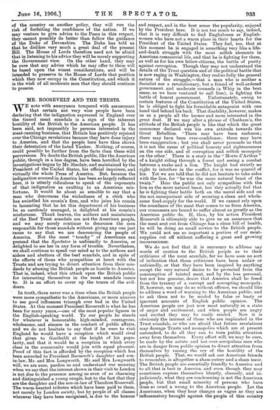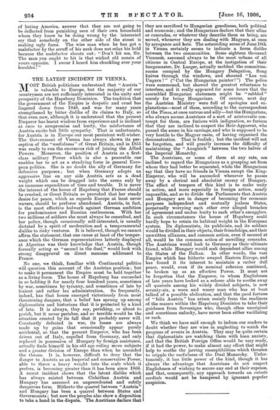MR. ROOSEVELT AND THE TRUSTS.
WE note with annoyance tempered with amusement that certain not very wise people have been declaring that the indignation expressed in England over the tinned meat scandals is a sign of the inherent hostility of the British to the American people. It has been said, not impossibly by persons interested in the Meat-canning business, that Britain has positively rejoiced over the Chicago revelations because they have done injury to America, and that the people here have thus shown their detestation of the hated Yankee. Nothing, of course, could possibly be further from the facts than these wild perversions. No doubt the-British public, like the American public, though in a leis degree, have been horrified by the investigations begun by Mr. Sinclair, and maintained by the President of the United States, his official inquirers, and virtually' the whole Press of America. But, because the indignation aroused in America has been so largely reflected here, it is utterly ridiculous to speak of the exponents of that indignation as exulting in an American mis- fortune. It would be about as sensible to say that a man who denounces the wickedness of a clerk who has swindled his cousin's firm, and who joins his cousin in lamenting that he let this department of his business be so carelessly managed, is delighted at his cousin's misfortune. Thank heaven, the authors and maintainers of the Beef Trust scandals are not the American people, and we may surely continue to denounce the men responsible for those scandals without giving any one just cause to say that we are denouncing the people of America. Not the most " touchy " of Americans can pretend that the Spectator is unfriendly to America, or delighted to see her in any form of trouble. Nevertheless, we shall continue to speak our mind as to the authors and • aiders and abettors of the beef scandals, and in spite of the efforts of those who sympathise at heart with the Trusts and are trying to divert attention from their mis- deeds by abusing the British people as hostile to America. That is, indeed, what this attack upon the British public for interesting themselves in the meat scandals comes to. It is an effort to cover up the traces of the evil- doers.
' In truth, there never was a time when the British people were more sympathetic to the Americans, or more anxious to see good influences triumph over bad in the United States. At this moment President Roosevelt is what he has been for many years,—one of the most popular figures in the English-speaking world. To our people he stands for whatever is honourable, high-minded, courageous, wholesome, and sincere in the conduct of public affairs, and we do not hesitate to say that if he were to visit England he would have a reception which would rival that given to Garibaldi at the height of his popu- larity, and 'that it would be a reception in which every class in the community would join with equal pleasure. Proof of this fact is afforded by the reception which has been accorded to President Roosevelt's daughter and son- in-law, Mr. and Mrs. Longworth. Mr. and Mrs. Longworth will, we are sure, pardon us and understand our meaning when we say that the interest shown in their visit to London is not due to the presence among us even of so charming and-distinguished a young couple, but to the fact that they are the daughter and the son-in-law of Theodore Roosevelt. The warm-hearted tributes which have been paid to them, not merely by London society, but by people of all classes wherever they have been recognised, is due to the honour and respect, and in the best sense the popularity, enjoyed by the President here. It is not too much to say, indeed, that it is very difficult to find Englishmen or English- women who have not a warm place in their hearts for the President of the United States. They feel, too, that at this moment he. is engaged in something very like a life- and-death struggle with the most selfish elements in American commercial life, and that he is fighting for them, as well as for his own fellow-citizens, the battle of purity against corruption. Though they may not understand the details of the Trust question and of the political battle that is now raging in Washington, they realise fully the general nature of the struggle,—that a man who is neither a Socialist nor a revolutionary, but a friend of well-ordered government and moderate counsels (a Whig in the best sense, as we have ventured to call him), is fighting the battle of honest government. Unfortunately, owing to certain features of the Constitution of the United States, he is obliged to fight his formidable antagonist with one hand tied behind his back. That disability, however, makes us as a people all the keener and more interested in the great duel. If we may alter a phrase of Chatham's, the attitude of the British people is like that which the great commoner declared was his own attitude towards the Great Rebellion. ' There may have been rashness ; there may have been over-confidence ; there may have been exaggeration ; but you shall never persuade us that it is not the cause of political honesty and righteousness on the one side, and of corruption and selfish monopoly on the other.' There is a story in the " Morte d'Arthur ' of a knight riding through a forest and seeing a combat between a snake and a lion. The knight had strictly no right to interfere in the conflict, for it was no quarrel of his. Yet we are told that he did not hesitate to take sides with the lion, for "he was the more natural beast of the twain." Here the public not only sympathise with the lion as the more natural beast, but they actually feel that he is fighting their battle both on the moral side and on the not unimportant side of securing a clean and whole- some food-supply for the world. If we cannot rely upon the soundness of the meat that comes to us from America, our consumers are bound to suffer almost as greatly as the American public do. If, then, by his action President Roosevelt is ultimately able to give us an assurance that the meat sent out from Chicago has a clean bill of health, he will be doing no small service to the British people. We could not see so important a portion of our meat- supplies cut off without suffering a great and growing inconvenience.
We do not feel that it is necessary to address 'Ulf words of caution to the British people as to their criticisms of the meat scandals, for we have seen no sort of indication that those criticisms have been unfair or unfriendly, or that they have been inspired by anything except the very natural desire to be protected from the consumption of tainted meat, and by the less personal, but not less genuine, desire that America shall be freed from the tyranny of a corrupt and corrupting monopoly. If, however, we may do so without offence, we should like to address a word of warning to the American public, and to ask them not to be misled by false or hasty or ignorant accounts of English public opinion. The American people are just now most naturally in a state of anger and excitement, and when people are angry and excited they may be easily misled. Now it is obviously the interest of those who are implicated in the Trust scandals, or who are afraid that future revelations may damage Trusts and monopolies which are at present untouched, to do all they can to turn public attention away from themselves. Every effort will, we may be sure, be made by the astute and not over-scrupulous men who are in danger from public opinion to divert attention from themselves by raising the cry of the hostility of the British people. That, we would ask our American friends to remember, is altogether a sham outcry and a sham issue. The British people are essentially friendly to America and to all that is best in America, and even though they may sometimes express themselves bluntly, clumsily, and in- judiciously, what they are condemning is not the American people, but that small minority of persons who have done so cruel a wrong to the American people. Let the Americans, when they hear charges as vague as they are inflammatory brought against the people of this country of hating America, answer that they are not going to be deflected from punishing men of their own household whom they know to be doing wrong by the interested cry that somebody on the other side of the street is making ugly faces. The wise man when he has got a malefactor by the scruff of his neck does not relax his hold because the malefactor shouts out: "Don't hit me, Sir. The man you ought to hit is that wicked old cousin of yours opposite. I swear I heard him chuckling over your troubles !"











































 Previous page
Previous page